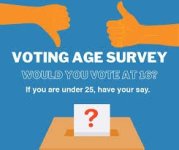In today's fast-paced world, 16-year-olds are increasingly stepping up as informed, passionate individuals who are deeply involved in societal issues. The question of whether they should be granted the right to vote is a hotly debated topic, with compelling arguments on both sides.
Proponents of lowering the voting age argue that 16-year-olds are mature enough to make informed decisions. With access to education, social media, and an unprecedented amount of information at their fingertips, young people today are more politically aware than ever before. Many 16-year-olds are already engaged in discussions about climate change, social justice, and the economy. In fact, some of the most impactful youth movements in recent years, like the climate strikes led by Greta Thunberg, have proven that teens are not only aware of global issues but are also actively pushing for change. Allowing them to vote would give these young advocates the voice they deserve in shaping policies that directly affect their future.
On the flip side, opponents argue that 16-year-olds lack the life experience and critical thinking skills needed to make such an important decision as voting. Adolescents are still undergoing cognitive development, and many might be swayed by their peers or social media influencers, leading to uninformed choices. Critics also argue that 16-year-olds may not fully grasp the long-term implications of political decisions, given their limited exposure to the complexities of adult life and financial independence.
However, the core issue here is fairness. If 16-year-olds are legally allowed to work, pay taxes, and drive cars, shouldn’t they also have a say in the policies that directly impact their lives? The right to vote is a cornerstone of democracy, and young people, who are often the ones pushing for change, should have the opportunity to help shape the future. Denying them this opportunity sends a message that their voices don’t matter — which contradicts the very principles of democratic equality.
In conclusion, it’s time to reconsider the age restrictions on voting. Young people today are more informed and engaged than ever before. If they’re old enough to contribute to society in meaningful ways, they should also be given the right to vote and influence the decisions that affect their lives. It’s time to trust the youth with the future they are already shaping.
Proponents of lowering the voting age argue that 16-year-olds are mature enough to make informed decisions. With access to education, social media, and an unprecedented amount of information at their fingertips, young people today are more politically aware than ever before. Many 16-year-olds are already engaged in discussions about climate change, social justice, and the economy. In fact, some of the most impactful youth movements in recent years, like the climate strikes led by Greta Thunberg, have proven that teens are not only aware of global issues but are also actively pushing for change. Allowing them to vote would give these young advocates the voice they deserve in shaping policies that directly affect their future.
On the flip side, opponents argue that 16-year-olds lack the life experience and critical thinking skills needed to make such an important decision as voting. Adolescents are still undergoing cognitive development, and many might be swayed by their peers or social media influencers, leading to uninformed choices. Critics also argue that 16-year-olds may not fully grasp the long-term implications of political decisions, given their limited exposure to the complexities of adult life and financial independence.
However, the core issue here is fairness. If 16-year-olds are legally allowed to work, pay taxes, and drive cars, shouldn’t they also have a say in the policies that directly impact their lives? The right to vote is a cornerstone of democracy, and young people, who are often the ones pushing for change, should have the opportunity to help shape the future. Denying them this opportunity sends a message that their voices don’t matter — which contradicts the very principles of democratic equality.
In conclusion, it’s time to reconsider the age restrictions on voting. Young people today are more informed and engaged than ever before. If they’re old enough to contribute to society in meaningful ways, they should also be given the right to vote and influence the decisions that affect their lives. It’s time to trust the youth with the future they are already shaping.

